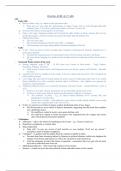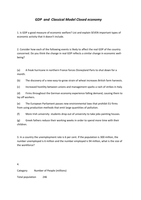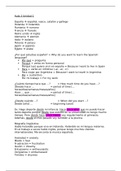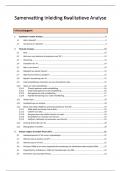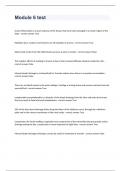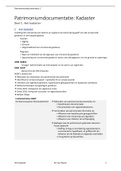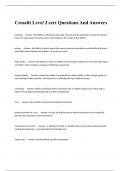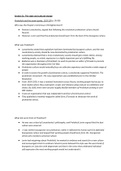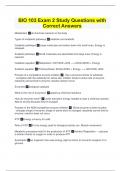Life
- Early Life:
o Born in Sulmo, Italy, to a father of the equestrian order.
Born just one year after the assassination of Julius Caesar and so lived through politically
turbulent times: 5 civil wars would occur before Ovid was 12 years old.
o Ovid moved to Rome around aged 16 if not before.
o Early in his reign, Augustus marked out Ovid and his older brother as future senators however his
brother died aged c. 20 and Ovid chose the poetic life rather than the political one.
o Married three times:
First two were short
His second marriage gave him his only child – a daughter.
Third marriage was longer and probably lasted the remainder of his life.
- Exile:
o 8 AD – Ovid was exile to Tomis (modern-day Constanta in Romania) by Emperor Augustus for “a
poem and a mistake”
He spent his remaining years in exile pining for his wife, his friends, and above all, Rome.
He wrote letters begging for a pardon for his mistake and aid in returning to Rome but he died in
Tomis.
- Social and Poetic context of his work
o During Augustus’ reign 27 BC – 14 AD, there was a boom in Latin poetry – Virgil, Horace,
Propertius, Tibullus, and Ovid.
Ovid moved in social circles with Propertius and even shared a patron with Tibullus – Messalla
Corvinus.
o Augustus was keen to emphasise moral values in his new empire and stop some of the corruption he
believed had occurred.
o Love Elegy (the style that Ovid had started his poetic career by following) often took as its central
theme forbidden love with a (usually) married object of affection – this tradition was opposed by
Augustus’ moral legislation.
o Traditional didactic poetry was in dactylic hexameter with short books – around 800 lines. (AA3 is
812)
Purpose was to take a lesson and present it in an interesting and innovative way.
We have no other erotic didactic poetry from the ancient world but we do have:
‘Sex manuals’ in prose – e.g., by Greek women Philaenis (4 th/3rd Century BC) and
Elephantis (1st Century BC)
Roman New Comedy – often featured a scene where an older female brothel owner would
instruct her young disciple in the ways of love.
o Ovid’s Ars Amatoria is written in elegaic couplets (traditional metre of love elegy)
His Metamorphoses were written in dactylic hexameter, suggesting that this break from tradition
was a deliberate choice.
He could have wanted to create a new genre-defying work
He could have wanted to ensure his poems were separated from the weighty and serious
epics which dactylic hexameter signified.
- Techniques:
o Metonyms – refer to the whole of something just by its part – e.g., Venus to mean love
o Repetition to emphasise or contrast ideas
o Ring composition
Ends with “so now my crowd of girls inscribe on your trophies ‘Ovid was my master’.”
(completes motif of military metaphors).
o Catalogues – to quickly teach his pupils about the variation available to them.
Prevents them from becoming tedious by littering in mythical allusions (which also heighten the
register of his poetry) and humour as well as the variation in styles themselves.
In all his catalogues he states that choice is important – reassurance that every girl will suit some
style and so individual taste wins out.
o Mythological allusions – often to provide evidence for his lessons.
o Humour – (stands out given the tense political climate and taboo nature of the content)
,Love and Desire
- Love and War:
o 1 - “I’ve given the Greeks arms against Amazons: arms remain, to give to you Penthesilea, and your
amazon troops”.
First word in Latin is “arma”/arms – same as the Aeneid (Ovid presenting this as an epic).
18 – Ring composition – “now my crowd of girls inscribe on your trophies ‘Ovid was my
master’.” – military metaphor and reference to Amazons (who have now changed allegiance to
Ovid).
o 1 – “It’s not fair for armed men to battle with naked girls”
o 1 – Venus says poor girls are “unarmed” and “betrayed to well-armed men?”
o 8 – “a warrior wars without his companion who’s been taken”.
o 11 – “I judge that countering fraud with fraud’s allowed, the law lets arms be wielded against arms”.
(Call-back to opening lines – love as war).
o 12 – Ovid describes how “Our good leader trusts those commanders with a squad, these with the
cavalry, that man to guard the standard” – analogy using tricolon of military posts to represent uses of
lovers.
o 14 – Ovid says that his teaching women has “unbarred the gates to the enemy”
- Love as a game:
o “Ovid’s view of human relationships is nothing if not pragmatic” – Green
o 8 – Women must learn “how to call the throws at knucklebones” – dice games and chess used as
analogies for love.
o 8 – Women must know “how to advance craftily, how to challenge” – analogies for how to advance
craftily/behave in love affairs.
o 8 – “nor should a spill be disturbed unless she can raise it.” – spills (like pick-up sticks) – don’t start
something if you can’t finish it.
o 8 – “There’s a thousand games to be had: it’s a shame for a girl not to know how to play”. (But a
noble woman shouldn’t really be scheming and flirting).
o 9 – Tactic – get yourself out there (game of numbers) – “there’s no prize for a face that truly lacks a
witness”. (Euphemism – word for witness also meant testicle in Latin).
o 11 – “It’s your concern to deceive your lovers” – encourages women to have lovers.
o 18 – “don’t let wild words be silent in the middle of your games” – talking about having sex
- Love as a skill to be learnt:
o 1 – “Only playful passions will be learnt from me”
o 1 – He blames the women abandoned by men (Medea, Ariadne, Phyllis, Dido) for “not knowing how
to love” -> blames the women for being abandoned.
o 2 – Says love is like sailing and they are currently “in harbour”.
17 – Ovid describes returning to teaching from a long description as back to work “so that my
weary vessel can reach harbour” (also sailing metaphor for sex)
o Men practicing these tactics
10 – tells women not to be “ensnared by a toga of finest threads” (wealth used to impress
women).
10 – “Perhaps the best dressed among them all’s a thief” (steals virginity).
o 11 – “Write elegantly girls, but in neutral ordinary words” – girls need a particular skill at writing.
o Flirting can go wrong
11 – “How often a doubting lover’s been set on fire by letters, and good looks have been harmed
by barbarous words!” – Contrasting impact of well vs. poorly written letter.
o 12 – “Glance at a glance, smile tenderly at a smile [...] return the signal you received.” – Women
should respond to male attention, not initiate it.
o 14 – Advice to lovers – e.g., when a woman has caught a lover “let him think that only he has access
to your room” then later “let him sense a rival” to use jealously to stir love.
14 – Includes a list of tricks to help with this, like a maid shouting “We’re lost!”
o 15 – They can pass letters through a maid with them under her top, “fastened to her calf”, or “beneath
her feet” – vivid sensual description of how the maid can carry letters and a tricolon of the types of
letters (“letters”, “papers”, “charming notes” trivialises the adultery).
o 15 – Also describes how to make invisible ink “with fresh milk”
o 15 – Suggests women can invite lovers to female-only festivals, lovers seen when “a friend feigns
illness”
o 15 – Women can sneak out when a jailor is “fuddled with much wine”, drugged, seduced, or bribed.
, 15 – “Believe me gifts captivate men and gods” – almost a verbatim quote from Euripides’
Medea and the following anaphora of “gifts” emphasises the power of bribery.
o 16 – Lists emotional tricks used by women to make gullible men think that they are loved – “look
longingly”, “sigh deeply”, “add tears”, “feigned grief”
o 17 – Ovid lists pleasant table manners:
17 – “Take the food daintily”, “stop before you’re full”
o 18 – Ovid introduces a catalogue of sexual positions using a combination of metaphors and very direct
descriptions of sexual positions.
18 – “One layout’s not suitable for all” – similar language used for clothes and hair colour as if
they are the same.
18 – Real positions interspersed with myth to add humour – “Milanion bore Atalanta’s legs on
his shoulders” – Atalanta was a runner so had good legs – use of myth adds humour.
- Love as a hunt:
o 9 – “The wolf shadows many sheep, to snatch just one [...] so too a lovely woman must let the people
see her”.
o 9 – “Often hounds wander the wooded hills in vain, and the deer, un-driven walks into the net” – the
men are the deer (unusual).
o 12 – “new love will balk when it sees the snare.”
o 16 – “The bird doesn’t show the hunter where to find it, the stag doesn’t teach the savage hounds to
run” – hunting metaphors make the women seem predatory.
- Speed and timings:
o 9 – Love can be at odd times – “Often a lover’s found at a husband’s funeral”.
o 11 – Don’t move too fast in love – “Muses, don’t smash the wheels with galloping.”
o 11 – “wait a little while before you answer: waiting always arouses love” – anaphora of waiting
emphasises it.
o 11 – “Make him fear and hope together, every time you write, let hope seem more certain and fear
grow less.” – Chiasmic arrangement of “hope” and “fear” to show hope gradually rising and highlight
those nouns.
- Love as dangerous:
o 12 – “When he’s practised, so, the boy [...] takes his sharp arrows from his quiver” – Cupid uses real
arrows.
o 14 – When talking about jealously Ovid says “See (I confess!), I don’t love unless I’m hurt.”
o 16 – Ovid gives a long description of Procris and Cephalus to warn against jealousy.
16 – Procris was killed by her jealousy – by using a detailed myth Ovid also shows his own
culture and poetic skill (e.g. vivid description of place (locus amoenus = pleasant place) a stock
motif in love poetry also used by Sappho).
o 17 – Love is deceptive – “Even if you’re plain, with drink you’ll seem beautiful” – tricolon of
lamplight, drink and “night itself”, implies women see more beautiful if not seen clearly and Ovid
contrasts reality with false impressions of beauty.
- Love associated with power
o 13 – Horse analogy about the one who controls or “rules a horse” and a few lines later “love and
power don’t last long when they’re shared”
Marriage/Relationships
- Context
o Ovid’s own wife was loyal throughout his exile, petitioned for his return and ran family affairs
o Augustan laws – if you had 3 or more citizen children, women were allowed to inherit
o A married woman was no longer a burden on her family (dowry grows the older she gets)
- Marriage/coupling is necessary to preserve one’s reputation and avoid being alone
o Because otherwise they’ll be old and die alone
1 – “Be mindful first that old age will come to you”
1 – “the years go by like flowing waters: the wave that’s past can’t be recalled again”
1 – “life slips by on swift feet” – so seize it while you can.
1 – “There’ll be a time when you, who now shut out your lovers will lie alone, and aged, in the
cold of night”
o Preserve reputation
11 – Importance of reputation to women – “don’t trust these tokens to a new young man. He who
keeps such tokens is treacherous”.

